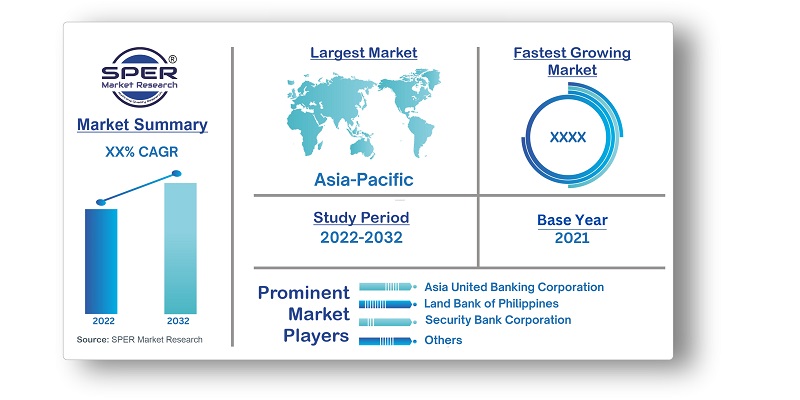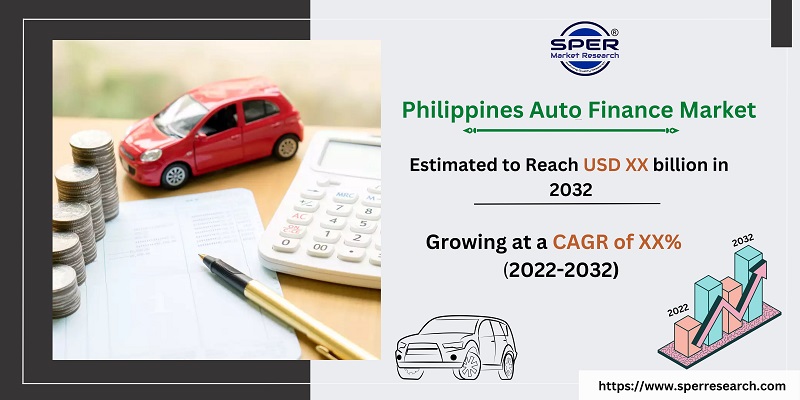
Philippines Auto Finance Market Growth, Trends, Size, Competition and Future Outlook 2032
Philippines Auto Finance Market Size- By Type of Vehicle Financed, By Banks and Non-Banks, By Type of Banking Institutions, By Nature of Vehicles, By Type of Vehicle Sold, By Tenure of Loans- Regional Outlook, Competitive Strategies and Segment Forecast to 2032
| Published: Feb-2023 | Report ID: AMIN2319 | Pages: 1 - 103 | Formats*: |
| Category : Automotive & Transportation | |||


| Report Metric | Details |
| Market size available for years | 2019-2032 |
| Base year considered | 2021 |
| Forecast period | 2022-2032 |
| Segments covered | By Type of Vehicle Financed, By Banks and Non-Banks, By Type of Banking Institutions, By Nature of Vehicles, By Type of Vehicle Sold, By Tenure of Loans |
| Regions covered | Luzon, Mindanao, Visayas |
| Companies Covered | MetroBank, BDO Bank, PS Bank, Eastwest Bank, The Philippine National Bank, Security Bank Corporation, Radiowealth Finance Company, Asia Link Finance Corporation League, DBP Leasing Corporation, BPI Capital Corporation, Cebu International Finance Corporation |
- Existing Auto Finance Companies
- Banks
- OEM Dealerships
- Captive Finance Companies
- Credit Unions
- Private Finance Companies
- New Market Entrants
- Government Organizations
- Investors
- Auto Mobile Associations
- Auto Mobile OEMs
- Motorcycles
- New Vehicles
- Used Vehicles
- Banks
- Non-Banks
- By Type of Banking Institutions
- Commercial and Universal Banks
- Thrift Banks
- New Vehicles
- Used Vehicles
- Commercial
- Motorcycles
- Passenger
- For New Vehicle
- For Used Vehicle
- Luzon
- Visayas
- Mindanao
- Size of Philippines Auto Finance Market (FY’2019-FY’2032)
- Overview of Philippines Auto Finance Market
- Segmentation of Philippines Auto Finance By Type of Vehicle Financed (Motorcycles, New Vehicles, Used Vehicles)
- Segmentation of Philippines Auto Finance Market By Banks and Non-Banks (Banks, Non-Banks)
- Segmentation of Philippines Auto Finance Market By Type of Banking Institutions (Commercial and Universal Banks, Thrift Banks)
- Segmentation of Philippines Auto Finance Market By Nature of Vehicles (New Vehicles, Used Vehicles)
- Segmentation of Philippines Auto Finance Market By Type of Vehicle Sold (Commercial, Motorcycles, Passenger)
- Segmentation of Philippines Auto Finance Market By Tenure of Loans (For New Vehicle, For Used Vehicle)
- Statistical Snap of Philippines Auto Finance Market
- Growth Analysis of Philippines Auto Finance Market
- Problems and Challenges in Philippines Auto Finance Market
- Competitive Landscape in the Philippines Auto Finance Market
- Impact of COVID-19 and Demonetization on Philippines Auto Finance Market
- Details on Recent Investment in Philippines Auto Finance Market
- Competitive Analysis of Philippines Auto Finance Market
- Major Players in the Philippines Auto Finance Market
- SWOT Analysis of Philippines Auto Finance Market
- Philippines Auto Finance Market Future Outlook and Projections (FY’2019-FY’2032)
- Recommendations from Analyst
1.1. Scope of the report1.2. Market segment analysis
2.1 Research data source
2.1.1 Secondary data2.1.2 Primary data2.1.3 SPER’s internal database2.1.4 Premium insight from KOL’s
2.2 Market size estimation
2.2.1 Top-down and Bottom-up approach
2.3 Data triangulation
4.1. Driver, Restraint, Opportunity and Challenges analysis
4.1.1 Drivers4.1.2 Restraints4.1.3 Opportunities4.1.4 Challenges
4.2. COVID-19 Impacts of the Philippines Auto Finance Market
5.1. SWOT analysis
5.1.1 Strengths5.1.2 Weaknesses5.1.3 Opportunities5.1.4 Threats
5.2. PESTEL analysis
5.2.1 Political landscape5.2.2 Economic landscape5.2.3 Social landscape5.2.4 Technological landscape5.2.5 Environmental landscape5.2.6 Legal landscape
5.3. PORTER’S five forces analysis
5.3.1 Bargaining power of suppliers5.3.2 Bargaining power of Buyers5.3.3 Threat of Substitute5.3.4 Threat of new entrant5.3.5 Competitive rivalry
5.4. Heat map analysis
6.1 Philippines Auto Finance Manufacturing Base Distribution, Sales Area, Product Type6.2 Mergers & Acquisitions, Partnerships, Product Launch, and Collaboration in Philippines Auto Finance Market
7.1 Motorcycles7.2 New Vehicles7.3 Used Vehicles
8.1 Banks8.2 Non-Banks
9.1 Commercial and Universal Banks9.2 Thrift Banks
10.1 New Vehicles10.2 Used Vehicles
11.1 Commercial11.2 Motorcycles11.3 Passenger
12.1 For New Vehicle
12.1.1 1 year12.1.2 2 years12.1.3 3 years12.1.4 4 years12.1.5 5 years or more
12.2 For Used Vehicle
12.2.1 1 year12.2.2 2 years12.2.3 3 years or more
13.1 Philippines Auto Finance Size and Market Share by Region (2019-2025)13.2 Philippines Auto Finance Size and Market Share by Region (2026-2032)13.3 Luzon13.4 Mindanao13.5 Visayas
14.1 Asia Link Finance Corporation
14.1.1 Company details14.1.2 Financial outlook14.1.3 Product summary14.1.4 Recent developments
14.2 Asia United Banking Corporation
14.2.1 Company details14.2.2 Financial outlook14.2.3 Product summary14.2.4 Recent developments
14.3 Bank of Commerce
14.3.1 Company details14.3.2 Financial outlook14.3.3 Product summary14.3.4 Recent developments
14.4 Bank of the Philippine Islands
14.4.1 Company details14.4.2 Financial outlook14.4.3 Product summary14.4.4 Recent developments
14.5 BDO Bank
14.5.1 Company details14.5.2 Financial outlook14.5.3 Product summary14.5.4 Recent developments
14.6 BPI Capital Corporation
14.6.1 Company details14.6.2 Financial outlook14.6.3 Product summary14.6.4 Recent developments
14.7 Cebu International Finance Corporation
14.7.1 Company details14.7.2 Financial outlook14.7.3 Product summary14.7.4 Recent developments
14.8 DBP Leasing Corporation
14.8.1 Company details14.8.2 Financial outlook14.8.3 Product summary14.8.4 Recent developments
14.9 Eastwest Bank
14.9.1 Company details14.9.2 Financial outlook14.9.3 Product summary14.9.4 Recent developments
14.10 Land Bank of Philippines
14.10.1 Company details14.10.2 Financial outlook14.10.3 Product summary14.10.4 Recent developments
14.11 MetroBank
14.11.1 Company details14.11.2 Financial outlook14.11.3 Product summary14.11.4 Recent developments
14.12 One Finance and Leasing Corporation
14.12.1 Company details14.12.2 Financial outlook14.12.3 Product summary14.12.4 Recent developments
14.13 PS Bank
14.13.1 Company details14.13.2 Financial outlook14.13.3 Product summary14.13.4 Recent developments
14.14 Radiowealth Finance Company
14.14.1 Company details14.14.2 Financial outlook14.14.3 Product summary14.14.4 Recent developments
14.15 Robinsons Bank
14.15.1 Company details14.15.2 Financial outlook14.15.3 Product summary14.15.4 Recent developments
14.16 Security Bank Corporation
14.16.1 Company details14.16.2 Financial outlook14.16.3 Product summary14.16.4 Recent developments
14.17 The Philippine National Bank
14.17.1 Company details14.17.2 Financial outlook14.17.3 Product summary14.17.4 Recent developments
14.18 Toyota Financial Services Philippines Limited
14.18.1 Company details14.18.2 Financial outlook14.18.3 Product summary14.18.4 Recent developments
14.19 UPCB Bank
14.19.1 Company details14.19.2 Financial outlook14.19.3 Product summary14.19.4 Recent developments
14.20 Union Bank
14.20.1 Company details14.20.2 Financial outlook14.20.3 Product summary14.20.4 Recent developments
14.21 Unistar Credit and Finance Corporation
14.21.1 Company details14.21.2 Financial outlook14.21.3 Product summary14.21.4 Recent developments
SPER Market Research’s methodology uses great emphasis on primary research to ensure that the market intelligence insights are up to date, reliable and accurate. Primary interviews are done with players involved in each phase of a supply chain to analyze the market forecasting. The secondary research method is used to help you fully understand how the future markets and the spending patterns look likes.
The report is based on in-depth qualitative and quantitative analysis of the Product Market. The quantitative analysis involves the application of various projection and sampling techniques. The qualitative analysis involves primary interviews, surveys, and vendor briefings. The data gathered as a result of these processes are validated through experts opinion. Our research methodology entails an ideal mixture of primary and secondary initiatives.



Frequently Asked Questions About This Report
PLACE AN ORDER
Year End Discount
Sample Report
Pre-Purchase Inquiry
NEED CUSTOMIZATION?
Request CustomizationCALL OR EMAIL US
100% Secure Payment






Related Reports
Our Global Clients
Our data-driven insights have influenced the strategy of 200+ reputed companies across the globe.






















